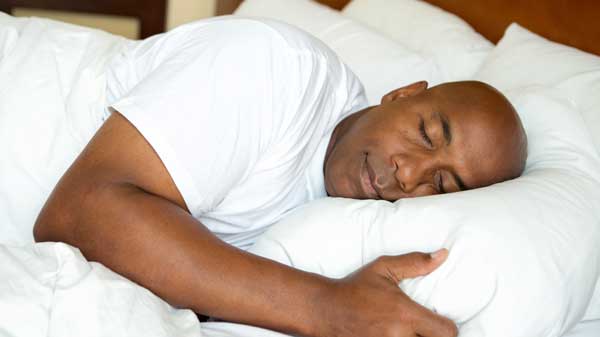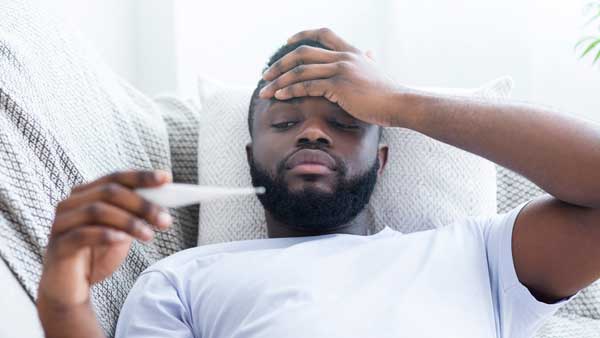When was the last time you woke up feeling refreshed, rejuvenated, and ready to take on your day? If you’re like most Canadian men, chances are it wasn’t this morning. You may have heard that not getting enough sleep can lead to a host of health risks, like lower testosterone, poor concentration, and even a stroke.
One-quarter of Canadians aged 18 to 64 don’t get enough sleep, according to Statistics Canada. The reasons behind this phenomenon aren’t fully understood, but we do know things like young kids, work, stress, and a lack of exercise can eat away at the length and quality of your ZZZ’s.
But what about guys who walk that edge between sleep deprivation and the bare minimum? Let’s take a look:
Can you survive on 6 hours of sleep?
It’s true that some people can sneak in just 6 hours of shuteye each night and still kick butt. Even if you wake up feeling rested, is 6 hours enough? For some, the answer is yes. There is a rare genetic mutation that reduces the need for sleep.
For everybody else, men between the ages of 26 and 64 need between 7 to 9 hours of sleep for physical and mental well-being.
How much sleep do you need?
The ideal amount of sleep can vary from person to person. Some people are okay with 7 hours, and others need 9 hours. Factors to consider for your optimal sleep duration are daily activities, overall health and typical sleep patterns.
Here are some questions from the National Sleep Foundation to help you assess whether you are getting enough sleep each night:
- Are you healthy, productive, and happy on 7 hours of sleep? Or do you need more sleep to feel good?
- Do you use a lot of energy every day? Do you play a lot of sports or have a physically demanding job?
- Do you need a lot of caffeine to get through the day?
- When you don’t have to get up, do you tend to sleep more than on a typical workday?
An easy way to figure out if you’re getting enough sleep is to use a sleep tracker. There are wearable options to track your sleep, like a Fitbit Smartwatch, Apple Watch or an Oura Ring. Not only do these track how much sleep you’re getting, but they also track your REM and deep sleep cycles.
Once you’ve noticed some patterns with your sleep schedule, take a minute to assess your mood when you first get up and a few times throughout the day. If you’re irritable or finding it hard to concentrate, try going to bed earlier half an hour earlier for one week. Repeat as many times as needed.
Tips to get 7 to 9 hours of sleep

Do you find it challenging to get enough sleep every night? If you find yourself sleeping 6 hours or less, it might be time to have a look at your sleep habits.
Here are tips for better sleep hygiene:
Sleep on a consistent schedule
A consistent sleep schedule helps reset your sleep-wake body clock. When it’s in a steady rhythm, drowsy moments will hit when they need to, making falling asleep and waking up easier.
Get active for at least 20 minutes a day
If you’re lacking in the exercise department or feeling wired from your work stress, even a 20-minute brisk walk around the block can help you sleep better.
Create a bedtime routine
Following the same bedtime routine every night can help you fall asleep faster. Turn off technology at least 30 minutes before bed so you can unwind and be ready for sleep. Do your nightly routine in the same order: brush your teeth, read, turn off lights in the house, and have a pee. All of this sends signals to your brain that it’s time to start relaxing and get ready for slumber.
Learn how to fall back asleep in the middle of the night
Do you ever find yourself wide awake and stressed out at 3am? Whatever you do, resist looking at your phone. The best thing to do is get up and reset your bedtime routine. Check out more tips for falling back asleep after stress waking here.
Limit alcohol before bed
Alcohol can also affect your sleep if you drink right before bed. So give yourself between two to four hours before hitting the sack.
Turn down the volume on your nightly snorchestra
Not drinking enough water, drinking alcohol before bed, and being overweight can increase the likelihood of snoring. Check out more snoring hacks for better sleep here.
Keep your room clean
It can make it hard for your brain to relax when your bedroom is in a state of disarray since mess can be a source of stress. When your bedroom feels calm, comfortable, and quiet, your brain will associate the space with relaxation. Take some time to clear the clutter so you can breathe a deep sigh of relief as you drift peacefully into slumber.
Listen to your body cues
Pay attention to the cues your body gives you, and go to bed if you’re tired. Don’t ignore these signals in order to write one more email or watch one more show. Being overtired can change your mental state and make it harder to fall asleep.
What happens if you don’t get enough sleep?

Did you know that your immune system repairs itself while you sleep? That means not getting enough sleep increases your likelihood of catching a cold. Researchers discovered that people who sleep 6 hours a night or less are 4 times more likely to catch a cold when exposed to a virus compared to those who get 7 or more hours of sleep.
Besides getting the flu, being sleep-deprived contributes to weight gain and can put you at risk for type 2 diabetes and cardiovascular disease. Getting enough sleep has been associated with better testosterone production levels.
Try getting 7 to 9 hours of sleep for a week and see how you feel!
What are your favourite hacks for getting in some solid shuteye every night? Please share in the comments below!
Are You at Risk?
Learn your risk level for the most common men’s health conditions in 10 minutes with a free, confidential, and personalized report.

I am in my early 50s, and while I did not previously deliberately get less sleep than I needed (and wanted), more than 20 years of job-related anxiety has been the source of ongoing sleep problems. I have started using a sleep aid that I find I don’t even need every night–and it has the benefit of also helping a four-year chronic pain.
I have started using low-dose THC/CBD and it has helped me get 7 to 7.5 hours of sleep per night, and it has reduced the pain in an injury I incurred a few years ago. I find I do not need to use it every night, every-other night is sufficient most of the time.
Among the clear benefits of my improved sleep is better stress management and weight loss. I’m not overweight, but I do carry a spare tire from when I was overweight in my 30s; for the first time in well over a decade I think that is shrinking.
Everyone is different for example I hit level 4 within minutes of hitting the bed. After about 3.5 hours start coming out and awake by 4 hours no more needed shower and I am off and running. 5 or more I feel like a bag of sh**. I am 58 when I was younger 2 hours was more then enough.
That’s amazing! You might be one of the people that have a genetic mutation that greatly reduces the amount of sleep you need; it’s discussed in this article here.
~Canadian Men’s Health Foundation team member